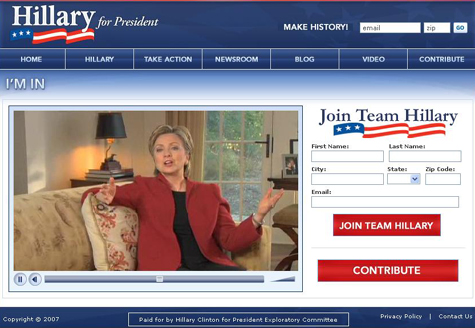Social Media conversations: Talking or selling?

Social media conversations have entered the big leagues, the high-stakes presidential ones.
The President of the United States is considered the most powerful person in the world; The political campaign to attain the presidency is among the most sophisticated marketing campaigns in the world.
Hillary Clinton used a slick video-enabled Website campaign headquarters last weekend to announce her non-campaign back to the White House in 2008.
In declaring her presidential “conversation,” Clinton nevertheless began with a purely self-focused political sales pitch: “I'm in. And I'm in to win.”

Clinton’s national “conversation” was inaugurated with a Clinton monologue framed by her conversational motive: “To win” the presidency.
Clinton is a consummate politician and campaigner. Every word uttered in her Web “conversations” with voters will be as scripted as her promotional stump speeches.
The packaging and selling of U.S. presidential candidates is the ultimate brand marketing pitch.
In “‘Branded Conversations’ frame social media in 2007” I present the dilemma brand marketers face in wanting to reach social networking audiences while fearing exposure of their brands in uncontrolled online social networking environments. I conclude:
How do brand marketers join the social media conversation then? By controlling and branding the conversations, while asserting that “users are in control.”
In “Web 2.0: Who controls the ‘conversations’?” I drill down on the social networking leaders and conclude At Facebook, MySpace, YouTube… are users “in control,” or are users being controlled by multi-million dollar corporate brand messages?